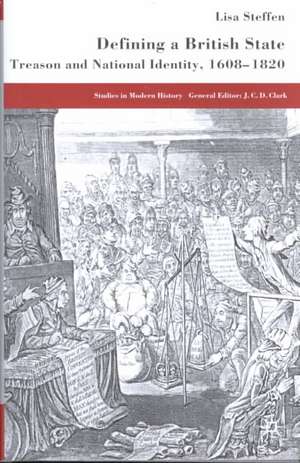Defining a British State: Treason and National Identity, 1608-1820: Studies in Modern History
Autor L. Steffenen Limba Engleză Hardback – 4 mai 2001
| Toate formatele și edițiile | Preț | Express |
|---|---|---|
| Paperback (1) | 637.28 lei 43-57 zile | |
| Palgrave Macmillan UK – 2001 | 637.28 lei 43-57 zile | |
| Hardback (1) | 643.00 lei 43-57 zile | |
| Palgrave Macmillan UK – 4 mai 2001 | 643.00 lei 43-57 zile |
Din seria Studies in Modern History
-
 Preț: 397.29 lei
Preț: 397.29 lei -
 Preț: 349.10 lei
Preț: 349.10 lei - 15%
 Preț: 642.36 lei
Preț: 642.36 lei - 15%
 Preț: 648.24 lei
Preț: 648.24 lei -
 Preț: 390.63 lei
Preț: 390.63 lei - 18%
 Preț: 955.08 lei
Preț: 955.08 lei - 15%
 Preț: 644.18 lei
Preț: 644.18 lei -
 Preț: 393.52 lei
Preț: 393.52 lei - 15%
 Preț: 640.24 lei
Preț: 640.24 lei -
 Preț: 390.63 lei
Preț: 390.63 lei -
 Preț: 390.63 lei
Preț: 390.63 lei - 18%
 Preț: 948.92 lei
Preț: 948.92 lei - 15%
 Preț: 648.24 lei
Preț: 648.24 lei -
 Preț: 418.07 lei
Preț: 418.07 lei -
 Preț: 388.72 lei
Preț: 388.72 lei - 18%
 Preț: 1005.61 lei
Preț: 1005.61 lei - 15%
 Preț: 644.82 lei
Preț: 644.82 lei - 18%
 Preț: 734.90 lei
Preț: 734.90 lei -
 Preț: 389.70 lei
Preț: 389.70 lei -
 Preț: 386.81 lei
Preț: 386.81 lei -
 Preț: 386.81 lei
Preț: 386.81 lei -
 Preț: 335.87 lei
Preț: 335.87 lei -
 Preț: 395.47 lei
Preț: 395.47 lei - 18%
 Preț: 945.79 lei
Preț: 945.79 lei -
 Preț: 438.27 lei
Preț: 438.27 lei -
 Preț: 391.61 lei
Preț: 391.61 lei - 15%
 Preț: 642.68 lei
Preț: 642.68 lei - 15%
 Preț: 641.38 lei
Preț: 641.38 lei - 38%
 Preț: 438.24 lei
Preț: 438.24 lei -
 Preț: 393.13 lei
Preț: 393.13 lei - 15%
 Preț: 636.12 lei
Preț: 636.12 lei - 15%
 Preț: 646.30 lei
Preț: 646.30 lei -
 Preț: 390.63 lei
Preț: 390.63 lei -
 Preț: 387.20 lei
Preț: 387.20 lei - 18%
 Preț: 726.02 lei
Preț: 726.02 lei - 15%
 Preț: 643.16 lei
Preț: 643.16 lei - 15%
 Preț: 645.79 lei
Preț: 645.79 lei -
 Preț: 389.70 lei
Preț: 389.70 lei -
 Preț: 384.70 lei
Preț: 384.70 lei - 15%
 Preț: 640.71 lei
Preț: 640.71 lei
Preț: 643.00 lei
Preț vechi: 756.47 lei
-15% Nou
Puncte Express: 965
Preț estimativ în valută:
123.03€ • 128.81$ • 101.81£
123.03€ • 128.81$ • 101.81£
Carte tipărită la comandă
Livrare economică 07-21 aprilie
Preluare comenzi: 021 569.72.76
Specificații
ISBN-13: 9780333920343
ISBN-10: 0333920341
Pagini: 245
Ilustrații: X, 245 p.
Dimensiuni: 140 x 216 x 20 mm
Greutate: 0.49 kg
Ediția:2001
Editura: Palgrave Macmillan UK
Colecția Palgrave Macmillan
Seria Studies in Modern History
Locul publicării:London, United Kingdom
ISBN-10: 0333920341
Pagini: 245
Ilustrații: X, 245 p.
Dimensiuni: 140 x 216 x 20 mm
Greutate: 0.49 kg
Ediția:2001
Editura: Palgrave Macmillan UK
Colecția Palgrave Macmillan
Seria Studies in Modern History
Locul publicării:London, United Kingdom
Cuprins
Author's Note and Acknowledgements Introduction Treason, Allegiance and Sovereignty in England, 1608-1688 Dynastic Treason: National Identity after the Glorious Revolution A British Law of Treason, 1709-1783 Republican Treason and National Identity in the 1790s The 'General Safety of the State': Treason from 1816-1820 Conclusion Bibliography Index
Recenzii
'In Defining a British State , Lisa Steffen has given us both a valuable insight into the law of high treason and its use in Stuart and Hanoverian England, and a thought-provoking discussion of the meanings behind the doctrine. She shows how a medieval English law designed to maintain the personal bond of allegiance to the sovereign was flexible enough to be used against Scots professing continued allegiance to their de jure king, in order to secure the Hanoverian succession against Jacobite attacks, but proved harder to use when the government sought to convict enemies of the state whose target was not the king. Her discussion is an important one, for both legal and political historians, and makes a useful contribution to the ongoing debate about the nature of the state in the eighteenth century.' - Michael Lobban, Brunel University
Notă biografică
LISA STEFFEN is Assistant Professor of History at the University of South Carolina Spartanburg.














